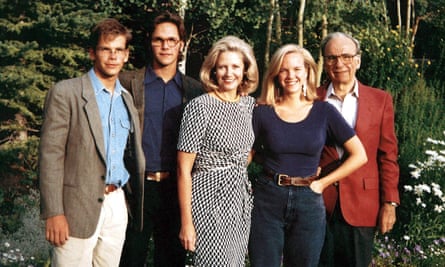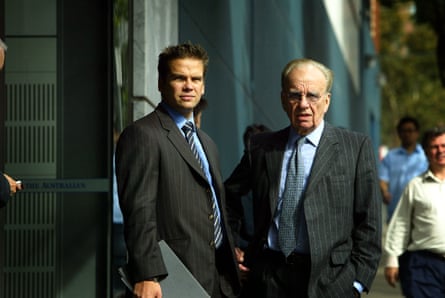Extract from The Guardian

Last modified on Sat 19 Sep 2020 06.01 AEST
Two months after it aired in the UK the eagerly awaited three-part BBC documentary, The Rise of the Murdoch Dynasty, will finally be available to Australian viewers this weekend.
Rejected by Rupert Murdoch’s Foxtel, the rights to the series were snapped up by the ABC.
Here are 10 takeaways from the doco:
1. Murdoch’s Australian years
First things first – this is a three-hour sweep through Murdoch’s whole life and so it’s not just about Australia. In fact, there is not a huge amount about the land of his birth or its newspapers beyond the story of inheriting his father Sir Keith Murdoch’s sole title in Adelaide.
But a 2014 interview by the Australian’s editor-at-large, Paul Kelly, is a highlight for all the wrong reasons. An obsequious Kelly’s question to his boss: “Rupert Murdoch, congratulations on 50 years at the Australian, the national newspaper that you created,” prompts the narrator to say, “You can see the esteem in which he is held here.”
2. His view of the climate emergency.
Kelly asks Murdoch how the Oz should approach climate change: “One of the great issues the paper has been wrestling in recent years is the balance between environmental concerns, climate change concerns on the one hand, and the need on the other hand to maintain a competitive economy and to ensure that costs don’t escalate too much. What is the way Australia should approach this issue?”
Murdoch says: “Climate change has been going on as long as the planet is here. And there will always be a little bit of it,” and in the worst-case scenario global temperature will rise by 3C over 100 years, and if “the sea level rise six inches it’s a big deal, the Maldives might disappear, but we can’t mitigate that, we can’t stop it, we just have to stop building vast houses on seashores”.
3. Descriptions of Murdoch’s character
The late writer Dennis Potter: “I call my cancer Rupert ... There is no one person more responsible for the pollution of what was already a fairly polluted press and the pollution of the British press is an important part of the pollution of British political life.”
The former Guardian editor-in-chief Alan Rusbridger: “It’s difficult to think of a prime minister in the last 40 years who has won against the Murdoch instinct.”
The former editor of the Sun David Yelland: “To speak objectively about him even so many years after I’ve worked for him is difficult.”
The actor and phone hacking victim Hugh Grant: “I don’t believe that David Cameron or Tony Blair really dared cough without first getting permission from Rupert Murdoch.”
Paul Keating’s advice, according to Tony Blair’s adviser Alastair Campbell, on handling Rupert: “Two things you need to know about Rupert Murdoch, he’s a really hard bastard and the only way to deal with him is to be a really hard bastard or he’ll have no respect for you at all.” The second was that his only priority is himself and his business interests.
4. Fox News’ role in Trump’s presidency
The former Trump adviser Steve Bannon says Murdoch was “the most anti-Trump of all” in the beginning. His paper the Wall Street Journal described Donald Trump’s campaign as “a catastrophe”. Murdoch was invited to a lunch with Ivanka Trump and insisted that Trump would not run for the presidency.
Bannon says Fox News tried to “kneecap” Trump with aggressive questions from Megyn Kelly at the first presidential debate but Trump’s off-the-cuff responses showed he could handle anything.
But others say Trump had been prepared by the Fox News founder Roger Ailes, who tipped him off to the line of questioning.
5. The British government connections
There is a complex graphic showing the web of relationships between key Murdoch lieutenants and Blair’s Labour government. The News UK executive Rebekah Brooks, an “unofficial member of the government”, is portrayed as being as close as a daughter. “The extent and the depth of involvement of News International on one hand and the British government on the other hand is unprecedented,” the BBC interviewer and former Murdoch editor Andrew Neil says. “This wasn’t just Rupert Murdoch, this was all of his editors all the senior executives and they were influential on policy and in the papers. It was a two-way street.”
6. And more on British politics
The leader of the Brexit party, Nigel Farage, says Murdoch asked for a private meeting and wanted to know what he was all about. Over wine from Murdoch’s winery Farage told him all about his then party, the UK Independence party. Farage credits Murdoch with stopping Britain from joining the euro.
He says he asked Murdoch’s permission to do the interview. “To be honest, I did ask him if whether I should do this and he said, ‘Yes, do it,’ and if he’d have said no I wouldn’t have done it and I think historically some of this stuff is really important.”
7. Family anecdotes
In an early television interview Murdoch says if his son James screws up he’ll sack him just as he would anyone else.
James, who is described as the black sheep of the family and who dropped out of Harvard and invested in rap music, kept a gun under his desk when he owned a rap label, according to the former Murdoch editor Piers Morgan.
In
an old TV interview James’s older brother, Lachlan, says the family
love getting into debates and will take sides in arguments they don’t
believe in just for fun.
8. The thorns in his side
“The phone-hacking saga never really was about reporters breaking the law,” Davies says. “It was always a story about power and the fear that people have of that power. Davies teamed up with Grant, Max Moseley and the Labor MP Tom Watson to support each other in the fight for justice for the victims of phone hacking.
9. Some people love Murdoch
David Yelland: “He was and remains one of the most interesting people in the world. I learned more from listening to him for five minutes than I would in two or three years at any other media company.”
The Apprentice UK host Alan Sugar: “Who would I look up to, who do I admire? Certainly Rupert Murdoch comes top of the tree, simply because of his swashbuckling ways of doing things, of getting on with it.”
Murdoch’s daughter Elisabeth: “I think he gave us all a sense of braveness. If you work hard and you take risks you’re actually OK.”
10. And more British politics
Neil Wallis, a former deputy editor of the Sun, tells the story of how Murdoch told him he was doing everything wrong in the Sun’s coverage on the first day of the election campaign that saw Blair become prime minister.
Murdoch went to his office and said: “You’re getting this wrong. You’ve got this totally wrong. We are not just backing Tony Blair. We are going to back the Labor party and everything he does in this campaign 200% and you’ve got to get that right.”
• The first episode of The Rise of the Murdoch Dynasty screens on ABC TV on Sunday 20 September at 7.40pm. All three episodes will be available to binge on iView on Sunday.

No comments:
Post a Comment